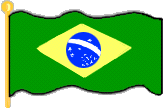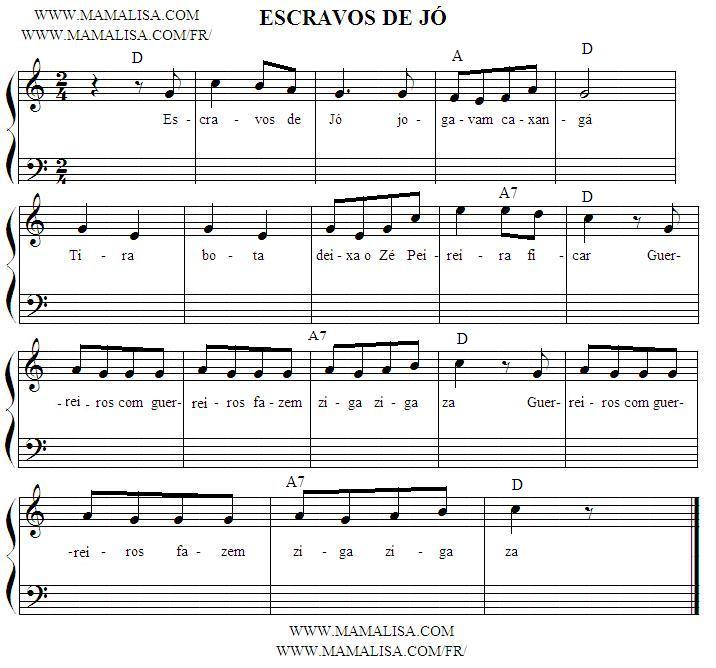Escravos de Jó
"Escravos de Jó" is a well-known circle game played in Brazil. Everyone has an object that they pass to their neighbor and it goes around the circle.
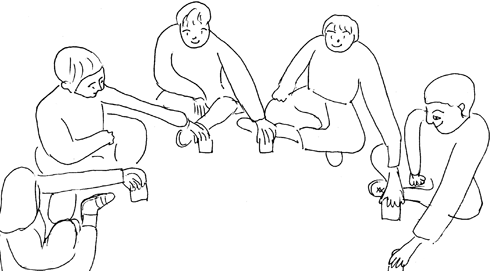
Escravos de Jó
Slaves of Job
Circle Game
Circle Game
(Portuguese)
(English)
Escravos de Jó
Jogavam Caxangá*
Tira, põe, deixa ficar
Guerreiros com guerreiros fazem Zig Zig Zá
Guerreiros com guerreiros fazem Zig Zig Zá
The slaves of Job
Played Caxanga*
Take it out, put it back, leave it on.
Warriors with warriors do zig zig za
Warriors with warriors do zig zig za.
Notes
*Caxangá is the name of a game, pronounced "cashangah". It's also the name of a blue crab and a sailor's cap.
In place of the 3rd line, some people sing:
"Deixa o Zé Pereira ficar" (Let Joe Pereira stay.)
Or:
"Deixa o zabelê ficar" (Leave the tinamou on.) A tinamou is a Brazilian bird.
Game Instructions
"The players sit in a circle, each one holding an object (it could be a box of matches, a cup, a rock, a shoe, etc.) in their hands. While they are singing, they need to pass the object to the next person in the circle, until they reach the line "Guerreiros com guerreiros" (Warriors with warriors). At the end of that line they say, "zig zig zá" and the players all make a back and forth movement with the object, without passing it to the next person. The funny part is they will keep singing the song over and over again, but it goes faster and faster each time." -Sent by Carla Schlucat
Comments
Silvia Aguiar wrote, "You can use basically anything to play this game (we used to do it at the dinner table before dinner with the family using the dishes or glasses).
Start moving the object continuously to the right and the person on the right doing the same until you reach the word "Tira" (take it away from the table),
"Poe" (return it to the table),
"Deixa ficar" (leave it on the table without touching it)."
***
Eduardo de Lima Pereira sent me the following version of the song...
Os escravos de Jó jogavam caxangá.
Os escravos de Jó jogavam caxangá.
Tira, põe,
Deixa o Zé Pereira ficar.
Guerreiros com guerreiros
Fazem zig-zig-zag!
Eduardo said, "I'll try to give you an approximate translation:"
Job's slaves used to play "caxangá"
Job's slaves used to play "caxangá"
Draw it, lay it down,
Let Joe Pereira (pear tree) play.
Warriors and other warriors
Play like this: zig-zig-zag!
Eduardo wrote, "This Brazilian children's song is a very ancient tune, and still very popular. People sit in a circle on the floor, each one having in front of him a stone, or a wooden stick, any kind of object that can make a noise when beaten on the floor (even shoes...). As you sing the song in a binary rhythm, you pass the object you have to the guy at your right. When you come to the part "fazem zig-zig-zag" you just beat the object before your pal at the right beats it again in front of you, and only on the third pass do you drop it before him.
Young adults play the same way in pubs, using their glasses instead of their shoes, of course! :)
The word caxangá has a Brazilian-native (Tupi) origin. It's the name of a very peculiar crab - called a blue crab (callinectes sapidus). It's very common in the Brazilian Coast and can be found also in the USA, in Chesapeake Bay.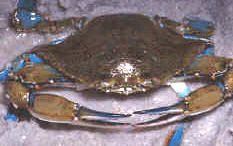
In the State of Bahia it's the name given to a flat sailor's cap. 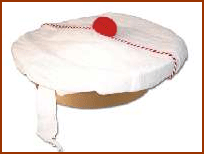
Keep up with the good job."
Yours,
Eduardo de Lima Pereira
***
Joao Bader explains more about the song and the regional differences...
"Dear Mama Lisa
I am just discovering your nice site. Congratulations.
Regarding the song 'Escravos de Jó', as far as I remember the words are :
Escravos de Jo'
Jogavam caxanga'
Tira...bota...
Deixa ficar
Guerreiros com guerreiros
Fazem zig-zig-za'
Guerreiros com guerreiros
Fazem zig-zig-za'
But I believe in some areas the 4th line may be:
"Deixa o Zé Pereira ficar"
Especially in the Brazilian North East, where Zé Pereira is a popular folkloric personage.
This song is normally sung in a circle, around a table. Each child must have something in her hand, like a stone, a piece of wood, etc. At each stressed syllabe of the song, each child knocks on the table with the object in her hand, passing it on to the next child. On some syllables the objects go on and comeback many times, to finally go on definitely.
I don't know anything about the origin of this song, sorry.
Regarding the translation I am not able to do it, but I will try to translate at least part of it.
"Escravos de Jo' " means "Slaves of Job" (biblical personage, who was very patient).
"Jogavam caxanga' " means "(they) were playing caxanga", where caxanga' is a kind of game.
"Tira...bota..." means "take it out...put it in" (meaning the object that the child has in her hand, and its movement going on, coming back).
"Deixa ficar" means "let it stay" (referring to the same object in the child' s hand).
In case of "deixa o Zé Pereira ficar" the meaning changes to "let Zé Pereira stay", referring to a folkloric personage called Zé Pereira, claiming "let him stay".
"Guerreiros com guerreiros" means "warriors with warriors" or perhaps "warriors against warriors".
"Fazem zig-zig-za' " means "(they) do a zig-zag movement" (referring to the warriors, and doing a zig-zag with the objects in the children' s hands).
I hope this can help you.
Kindest regards,
Joao Bader
***
Here's an alternative score thanks to Eduardo de Lima Pereira...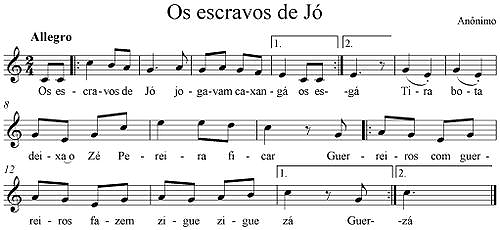
***
Thanks again to everyone who wrote in about this song!
If anyone would like to send me a recording of the song to post, that would be great. Thanks! - Lisa


Thanks!
Thanks!
Thanks and Acknowledgements
Many thanks to all of the people who sent in this song and provided English translations and such useful game instructions: Silvia Aguiar, Kelly from Curitiba, Paraná (in Brazil), Carla Schlucat, Juarês De Mira, Nádia Latif, Adriana Betioli, Helena Terra, Eduardo de Lima Pereira, Joao Bader and Thais Lins. Thanks also to Monique Palomares for the midi music and the illustration, to Iona for the guitar chords and to Eduardo de Lima Pereira for the sheet music.
Obrigada!


